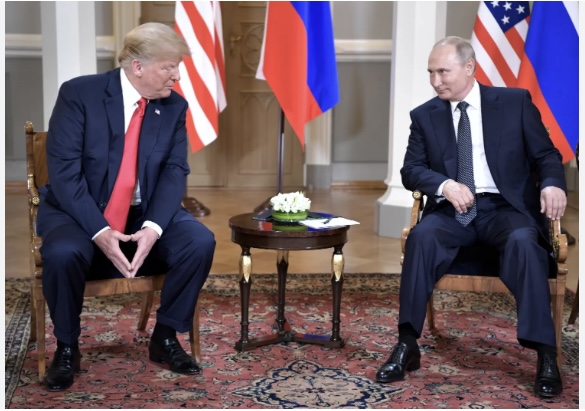Over the past three years of the escalating Russia-Ukraine conflict, U.S. President Donald Trump has repeatedly shifted his position on whom to support, oscillating between praise for Russian President Vladimir Putin and criticism of Ukrainian President Volodymyr Zelensky. His evolving stance has had a notable impact on the war and U.S. foreign relations.
In 2022, as Russia launched its invasion of Ukraine, Trump publicly called Putin a “genius” and described the attack as “savvy.” He also claimed that he could end the war within 24 hours if he were president—an assertion he frequently repeated during his campaign. Initially appearing sympathetic to Russia’s position, Trump gradually shifted his tone as the conflict dragged on.
A turning point came during a contentious Oval Office meeting in February 2025 with Zelensky, where Trump reportedly blamed the Ukrainian president for the war. Despite this confrontation, Trump’s rhetoric soon shifted again—this time directing his frustration toward Putin for continuing the attacks.
Throughout his presidential campaign, Trump was reluctant to declare clear support for Ukraine. Reports from The Washington Post suggested that behind closed doors, he considered pressuring Ukraine to cede territory to end the war, while publicly reiterating his promise to resolve the conflict quickly if re-elected.
Trump further escalated tensions with Ukraine by calling Zelensky a “dictator without elections” and asserting that the Ukrainian leader bore responsibility for the war. This came after U.S. and Russian officials met in Riyadh without Ukrainian involvement—an exclusion Trump defended by saying Ukraine had “three years to end it.”
Zelensky’s U.S. visit on February 28 led to another intense exchange, with Trump criticizing his leadership and accusing him of putting Ukraine in a weak position. Vice President JD Vance also joined the criticism. Their argument caused delays in a pending rare earth minerals agreement between the U.S. and Ukraine.
Despite the friction, Trump’s tone continued to evolve. He expressed anger toward Putin, especially after questioning Zelensky’s legitimacy. Trump even floated the idea of imposing new tariffs on Russian oil if peace efforts failed. While calling Putin “disappointing,” Trump paradoxically claimed he still trusted the Russian leader, saying, “I don’t think he’s going to go back on his word.”
In a Truth Social post, Trump directly addressed Putin: “Vladimir, STOP!” condemning Russian missile strikes on Kyiv as “not necessary” and ill-timed.
In April, Trump and Zelensky met again—this time at the Vatican during Pope Francis’ funeral. Zelensky described the encounter as “symbolic” and potentially historic. Trump used the opportunity to criticize Putin once more, questioning his commitment to peace and suggesting new financial sanctions might be necessary.
Shortly after, the U.S. and Ukraine signed a long-term strategic minerals agreement aimed at boosting Ukraine’s reconstruction and global integration. Treasury Secretary Scott Bessent emphasized that the deal reflected the Trump administration’s commitment to a peaceful, sovereign Ukraine.
In May, Trump reportedly held a phone conversation with Putin and appeared to agree to a delay in ceasefire talks—contributing to the ongoing hostilities. As Russia intensified its offensive, Trump threatened new sanctions and openly condemned Putin’s actions.
“He’s killing a lot of people,” Trump said, expressing disbelief at Putin’s behavior. “I don’t know what the hell happened to Putin. I’ve known him a long time.” On Truth Social, Trump declared: “Putin has gone absolutely CRAZY!” and warned that trying to seize all of Ukraine could lead to Russia’s downfall.
In June, Trump and Zelensky met during the NATO Summit in The Hague. Trump called the meeting “very nice” and said Zelensky seemed eager to see the war end. He reiterated his plan to speak with Putin about ending the conflict and criticized Putin for being outwardly friendly but ultimately “meaningless.”
As relations with Zelensky improved, Trump pledged to send Ukraine advanced weaponry, including Patriot missiles, funded by the European Union. Still expressing disappointment with Putin, Trump said, “I thought he was somebody that meant what he said.”
In a final statement, Trump issued an ultimatum: if Putin did not stop the war within 50 days, Russia would face steep tariffs.



